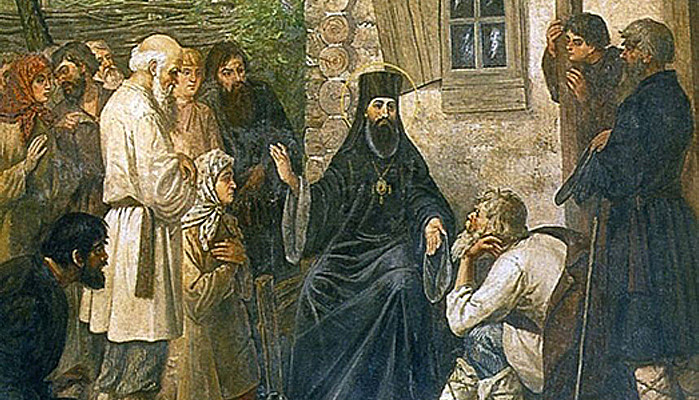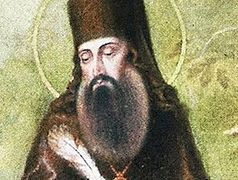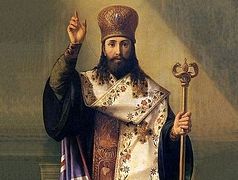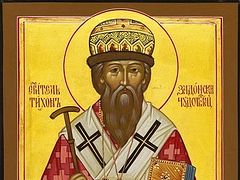On August 16, 2010, on the day of the repose (1783) and second finding of the relics (1991) of St. Tikhon, Bishop of Voronezh, Wonderworker of Zadonsk, His Holiness Patriarch Kirill of Moscow and All Russia celebrated the Divine Liturgy in the Vladimir Cathedral of the Zadonsk Nativity of the Theotokos Monastery. At the end of the service, His Holiness addressed those gathered with a primatial word.
Your Eminences and Graces! Vladyka Nikon, Sacred Archimandrite of this holy monastery, Bishop of Lipetsk and Yelets! Dear fathers and brothers! Dear Oleg Petrovich, Governor of the Lipetsk region! Dear pilgrims and fellow worshipers!
I rejoice at the chance to come to this glorious monastery on the day of the commemoration of St. Tikhon of Zadonsk, the wonderworker, intercessor, and enlightener of our land, to celebrate its 400th anniversary with you. Many glorious pages are inscribed in the history of this monastery, having played a huge spiritual role in the past; and this monastery shines forth in a special way by the presence of the holy and healing relics of St. Tikhon. He ended his days here—not on the throne as a ruling bishop, not in glory, but in humility and simplicity. From his hagiography it is known that in his last years, people became so accustomed to him being here, with them, that sometimes they could even offend the holy hierarch and say rude things to him—because this elder-recluse, who spent all his time in prayer and writing books, so little resembled a bishop.
Of course, the name of the Holy Hierarch Tikhon was already well known then to those who were interested in the spiritual life. But, of course, it often happens that people who live near a great person do not notice this greatness. He seems simple to them; he seems not so perfect as he is presented by those who read his books. Therefore, St. Tikhon’s time in retirement was, from a human point of view, not an easy affair. But it’s no wonder that the holy God-pleaser wrote about the mysteries of the inner life of man—because he himself possessed enormous spiritual experience, and he responded to offenses, to bitter words, to a lack of respect, with the deepest humility, bearing witness that even bitter words addressed to him did not cover all of his sinfulness, but were only an opportunity to partially expiate his sins by humility. He is the greatest example for us all.
It sometimes happens that people who do not even remotely live in solitude or in retirement, but conversely, in glory and honor, lose their presence of mind, get upset, worry, or fall into anger at even an indirect hint—not even from direct insults, because usually no one dares to offend such people. Humility is the greatest Christian virtue; it is not a human weakness, but inner strength. To not answer one who offends you, to remain silent before one who insults you, to be aware of your sins and where you are wrong when slander comes your way is the highest level of human freedom. Where did St. Tikhon acquire all of this from? From the word of God. He was taught by Christ Himself—just as are you and I are taught by the words of the Gospel, but he received them with his whole heart.
Today, on the day of the commemoration of the holy hierarch, we read a small passage from the fifth chapter of the Gospel according to St. Matthew, where we find amazing words: Ye are the light of the world. A city that is set on an hill cannot be hid (Mt. 5:14). And a little earlier in this Gospel, the Lord says to those listening to Him: Ye are the salt of the earth (Mt. 5:13). The salt of the earth, the light of the world… Not to the world, but of the world; that is, you are the best thing in the world. Who does the Lord address these words to? To the simple residents of Galilee who had gathered to hear the Savior on a hill on the coast of the Sea of Galilee, near the city of Capernaum, where the Lord lived during His stay in Galilee. Why did the Lord address these simple people, calling them the salt of the earth and the light of the world? Because He had just addressed them with other words. He addressed His Beatitudes to them—the very commandments in which are formulated the greatest moral laws of human existence.
These nine Christian commandments are not in any way opposed to the Ten Commandments of Moses. But as it says in the Gospel that we heard today, the Lord says about Himself that He came not to destroy the law—that is, the law of Moses—but to fulfill it. And he fulfills and completes the laws of Moses by these nine wonderful commandments: blessed are the poor in spirit, blessed are those who mourn, blessed are the meek, blessed are those who hunger and thirst after righteousness, blessed are the merciful, blessed are the pure in heart, blessed are the peacemakers, blessed are those who are persecuted for righteousness’ sake, blessed are those who are reviled and persecuted for Christ’s sake (cf. Mt. 5:3-11). And because the people of Galilee heard these words, and, of course, received them with their hearts, the Lord says: “Ye are the light of this world, because if you fulfil these commandments, you will be the light, you will be the power, you will be the beauty of this world.”
St. Tikhon of Zadonsk realized these commandments. From his inner experience he both preached and wrote his books, which still amaze readers with their deepest spirituality, their power, and their appeal. It’s not for nothing that these commandments are called the Beatitudes—commandments of human happiness—because by the will of God, man is built so that he can be happy only by living according to these commandments—not according to the elements of this world, not according to the tumult of human nature, not according to the instigation of false teachers, but according to these peaceful Divine commandments. Whoever fulfills them creates his inner spiritual world—a special world full of beauty, harmony, joy, peace, and happiness. This is the goal of human life, because no matter how we try to set other goals for ourselves, they are all transient and insignificant in comparison with this Divine purpose that is set before every man—to acquire beatitude, for which even the end of earthly life is not a limit, but which goes into eternity and blossoms there in that day without night of the Divine Kingdom.
We attentively hear and listen to the words of St. Tikhon, because he acquired this beatitude within himself, this joy, this happiness, this fullness of life; and whatever was before this inner beauty—transient human misery or pain, or offenses—is nothing, because a man’s inner beatitude gives him great power at the same time. We learn all of this from the word of God; we learn this from the experience of the lives of the saints, and all of this helps to better comprehend the finals words of today’s Gospel reading: Let your light so shine before men, that they may see your good works, and glorify your Father Which is in Heaven (Mt. 5:16). Amen.




